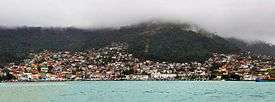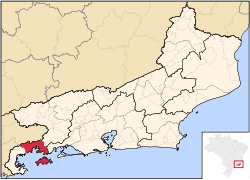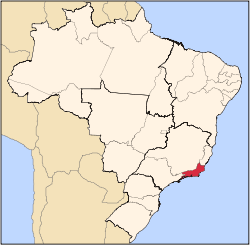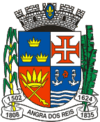Angra dos Reis
| Angra dos Reis | |||
|---|---|---|---|
 | |||
| |||
| Nickname(s): Angra | |||
 Location in the state of Rio de Janeiro and Brazil | |||
 | |||
| Coordinates: BR 23°00′24″S 44°19′05″W / 23.00667°S 44.31806°W | |||
| Country | Brazil | ||
| Region | Southeast | ||
| State | Rio de Janeiro | ||
| Founded | January 6, 1502 | ||
| Government | |||
| • Mayor | Conceição Rabha (PT) | ||
| Area | |||
| • Total | 816.3 km2 (315.2 sq mi) | ||
| Elevation | 1,378 m (4,521 ft) | ||
| Population (2010)[1] | |||
| • Total | 169,270 | ||
| • Density | 180.1/km2 (466/sq mi) | ||
| Time zone | UTC-3 (UTC-3) | ||
| • Summer (DST) | UTC-2 (UTC-2) | ||
| Website | www.angra.rj.gov.br | ||
|
Municipal Government address: Prefeitura Municipal de Angra dos Reis Praça Nilo Peçanha, 186 Centro, Angra dos Reis, CEP: 23900-000 | |||
Angra dos Reis (Portuguese pronunciation: [ˈɐ̃ɡɾɐ duʒ ˈʁejʃ]; Portuguese for Creek of the Kings) is a Brazilian municipality located in the southern part of Rio de Janeiro state. Angra is located at an altitude of 6 meters and includes in its territory 365 offshore islands.
It was discovered on January 6, 1502, but it has been under continual settlement since 1556. Its population was estimated, on July 1st, 2009, to be 168,664 inhabitants.
Location
Angra dos Reis has an area of 816.3 km². The neighboring municipalities are Paraty, Rio Claro and Mangaratiba in Rio de Janeiro state, and Bananal and São José do Barreiro, which are adjacent in São Paulo state.
The municipality contains the 12,072 hectares (29,830 acres) Ilha Grande State Park, created in 1971 on the Ilha Grande off the southern coast.[2] It contains the 3,502 hectares (8,650 acres) Praia do Sul Biological Reserve, a strictly protected conservation unit created in 1981 on the Ilha Grande.[3] It contains the 1,312 hectares (3,240 acres) Aventureiro Sustainable Development Reserve, formerly the Aventureiro Marine State Park, also on Ilha Grande.[4] The municipality also contains part of the Tamoios Ecological Station.[5] The conservation units are contained within the 12,400 hectares (31,000 acres) Tamoios Environmental Protection Area, created in 1982.[6]
History
The municipality fell into decline after 1872 with the advent of railways. It came back into prominence in the 1920s when a railway extension connected it to the states of Minas Gerais and Goias, as a terminus for the transportation of agriculture production from these same two states. The railway extension, in meter gauge, still exists and is currently operated by the Ferrovia Centro-Atlântica company.
In the mid-twentieth century, the municipality was an essential part of the implementation of Companhia Siderurgica Nacional – CSN, Volta Redonda, and the endpoint for coking coal supplied from Santa Catarina. Today, the same company also uses the port, in part, for its steel exports.
Its current importance is due, in part, to having a ferry terminal facility in the Bay of Ilha Grande and its harbour, used by TEBIG Petrobras, which transports large quantities of oil and thus positions the port of Angra dos Reis as one of the busiest in the country.
Today, because of its beautiful beaches and nearby regions, the place has become a focal point for tourism – not only statewide but on a national scale also. Within the municipality are over three hundred islands, many of them owned by national and international celebrities, with the largest one called Ilha Grande (Big Island). The pioneering Brazilian plastic surgeon and philanthropist Dr. Ivo Pitanguy was a noted resident.
Most of the place is covered by hills, and its hilly terrain helped generate the landslides that occurred at the beginning of 2010, when numerous homes and hotels were severely damaged or destroyed, mainly on Ilha Grande.
Economy
The most important economic activities are commerce, fishing, industry, services, and tourism. The port has an oil terminal as well as shipbuilding (Keppel Fels, former Verolme) facilities. Brazil's nuclear power stations, Angra I and Angra II are located nearby. They employ 3,000 people, and generate another 10,000 indirect jobs in Rio de Janeiro State. Tourism is highly developed with countless beaches, islands and pristine waters perfect for swimming or scuba diving. The nuclear power stations also warm the area's waters with their thermal discharges, a form of thermal pollution.
There is a small amount of cattle raising, with approximately 4,200 head. The main agricultural products cultivated are:
- bananas: 1,460 hectares / 3,600 tons
- coconut: 10 hectares / 130,000 fruits
- oranges: 4 hectares / 25 tons
- hearts of palm (palmito): 50 hectares / 75 tons
- sugarcane: 20 hectares / 390 tons
Data are from IBGE
Meaning of the name
Gaspar de Lemos, a navigator and commander of the Portuguese naval fleet landed at Ilha Grande on 6 January 1502, a “Kings’ day” – that is, “Dia de Reis”. Accordingly, the place was named “Angra dos Reis”, which means “Creek of the Kings” or loosely – “Anchorage of the Kings”.
Climate
According to Köppen climate classification, Angra dos Reis has a tropical rainforest climate (Af).
| Climate data for Angra dos Reis, Rio de Janeiro, Brazil | |||||||||||||
|---|---|---|---|---|---|---|---|---|---|---|---|---|---|
| Month | Jan | Feb | Mar | Apr | May | Jun | Jul | Aug | Sep | Oct | Nov | Dec | Year |
| Average high °C (°F) | 29.8 (85.6) |
30.4 (86.7) |
29.5 (85.1) |
27.6 (81.7) |
26.2 (79.2) |
25 (77) |
24.6 (76.3) |
25 (77) |
24.9 (76.8) |
25.6 (78.1) |
27 (81) |
28.6 (83.5) |
27.02 (80.67) |
| Daily mean °C (°F) | 26.2 (79.2) |
26.75 (80.15) |
26 (79) |
24.2 (75.6) |
22.55 (72.59) |
21.05 (69.89) |
20.55 (68.99) |
21.1 (70) |
21.55 (70.79) |
22.45 (72.41) |
23.7 (74.7) |
25.15 (77.27) |
23.438 (74.216) |
| Average low °C (°F) | 22.6 (72.7) |
23.1 (73.6) |
22.5 (72.5) |
20.8 (69.4) |
18.9 (66) |
17.1 (62.8) |
16.5 (61.7) |
17.2 (63) |
18.2 (64.8) |
19.3 (66.7) |
20.4 (68.7) |
21.7 (71.1) |
19.86 (67.75) |
| Average precipitation mm (inches) | 276.4 (10.882) |
240.2 (9.457) |
237.1 (9.335) |
189.5 (7.461) |
109 (4.29) |
78.3 (3.083) |
76.2 (3) |
78.2 (3.079) |
116 (4.57) |
144.1 (5.673) |
166.6 (6.559) |
265 (10.43) |
1,976.6 (77.819) |
| Average relative humidity (%) | 81 | 80 | 81 | 82 | 82 | 82 | 81 | 81 | 82 | 83 | 82 | 82 | 81.6 |
| Source: climate-charts.com[7] | |||||||||||||
Trivia
Júlia da Silva Bruhns, the mother of German writers Heinrich Mann and Thomas Mann, was born here.[8] However, there is disagreement about her exact place of birth, as some sources, including the German version of Wikipedia, assert she was born in the nearby town of Parati.
Former three-time Formula One world champion Ayrton Senna once made his residence in Angra Dos Reis.
References
- ↑ http://www.ibge.gov.br/home/estatistica/populacao/estimativa2006/POP_2006_DOU.pdf
- ↑ "Parque Estadual da Ilha Grande - Angra dos Reis - RJ", Ilhagrande.org (in Portuguese), retrieved 2016-09-23
- ↑ Reserva Biológica Estadual da Praia do Sul (in Portuguese), INEA, retrieved 2016-04-16
- ↑ PES Marinho do Aventureiro (in Portuguese), ISA: Instituto Socioambiental, retrieved 2016-09-23
- ↑ Unidade de Conservação: Estação Ecológica de Tamoios (in Portuguese), MMA: Ministério do Meio Ambiente, retrieved 2016-04-20
- ↑ APA de Tamoios (in Portuguese), INEA: Instituto Estadual do Ambiente, retrieved 2016-09-26
- ↑ "climate-charts.com". Retrieved January 5, 2013.
- ↑ Download family report, stating birthplace
External links
| Wikivoyage has a travel guide for Angra dos Reis. |
